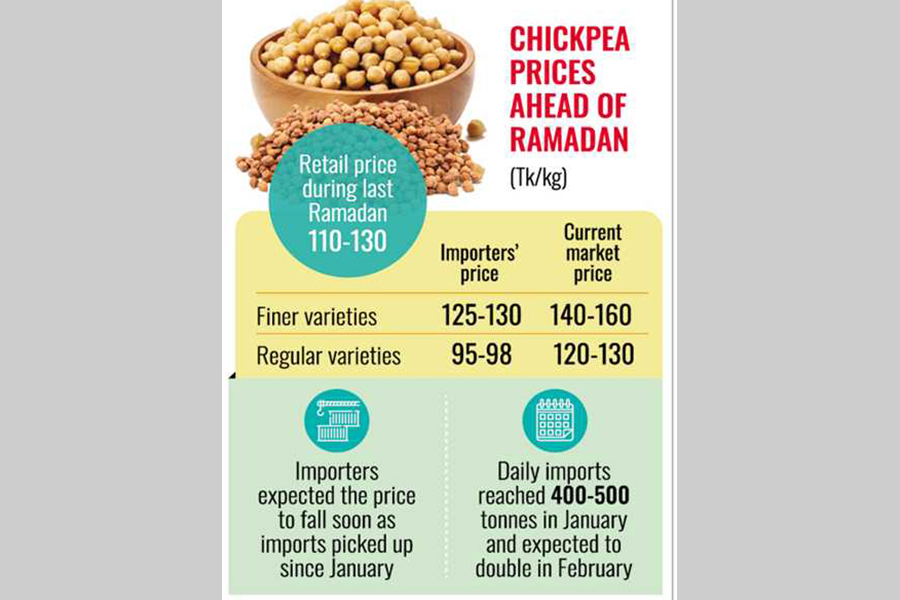
Published :
Updated :

Chickpea, a key component of iftar items during Ramadan, has registered a significant price hike even a month before the start of the fasting month.
Retailers in Dhaka are currently selling quality chickpea at Tk 140-160 per kg, while regular varieties are priced at Tk 120-130, according to local grocers.
This marks a sharp rise compared to last Ramadan, when prices ranged between Tk 110 and 130 per kg, according to data available with the Trading Corporation of Bangladesh (TCB).
Golam Kibria, a grocer in Jhigatola, says the price of quality chickpea has dropped slightly by Tk 10 per kg over the past week, but it is still Tk 25-30 higher than last year's.
He attributes this price surge to limited supplies from traders in Moulvibazar in the city as they are releasing smaller quantities at higher rates.
Abdur Rashid, a trader based in Moulvibazar, says reduced imports until December 2024 have driven prices up over the past two months.
Importers are currently supplying regular chickpea variety at Tk 95-98 per kg and quality chickpea at Tk 125-130.
Additionally, dabri, a type of green pea in high demand during Ramadan fast, is being traded at Tk 75-78 per kg in Moulvibazar, but it retailed at Tk 90-95.
Mr Rashid says retailers are charging much higher than wholesale rates, ultimately burdening consumers.
However, importers anticipate a price reduction as imports have picked up since January.
Md Rubel Hossain, manager of Chattogram-based Fatima Traders, says daily chickpea imports reached 400-500 tonnes in January and are expected to double in February.
However, global prices remain high, with Australian chickpeas priced at $780-800 per tonne, excluding freight and other charges.
A recent report by the Bangladesh Trade and Tariff Commission (BTTC) shows only 43,000 tonnes of chickpea were imported between October and December 2024, significantly lower than the same period in the previous year.
However, the volume of letters of credit (LCs) opened for January indicates a potential surge in imports.
The BTTC estimates that the maximum demand for chickpeas during Ramadan is around 80,000 tonnes.
It emphasises the need to manage foreign currency reserves effectively to cover import costs and maintain stable revenue and monetary policies.
It suggests that the Bangladesh Bank take necessary measures to this end.
The BTTC also stresses the importance of monitoring the stock and supply of lentil and chickpea in the local market, given the rising prices in the international market.
SM Nazer Hossain, vice-president of the Consumers Association of Bangladesh, condemns the price hike as unethical, especially ahead of Ramadan.
He questions the justification for price increases, citing ample recent imports.
Mr Hossain also criticises a distinct lack of effective market monitoring and potential biases in regulatory bodies that, he argues, prevent consumers from getting products at logical prices.
As Ramadan approaches, stakeholders are urging the authorities concerned to take actionable steps to stabilise prices of chickpea and other essentials through ensuring adequate supplies in the market.
tonmoy.wardad@gmail.com


 For all latest news, follow The Financial Express Google News channel.
For all latest news, follow The Financial Express Google News channel.